Summary of the Webinar “Geopolitics and conflicts in the Caucasus: current challenges and future developments”
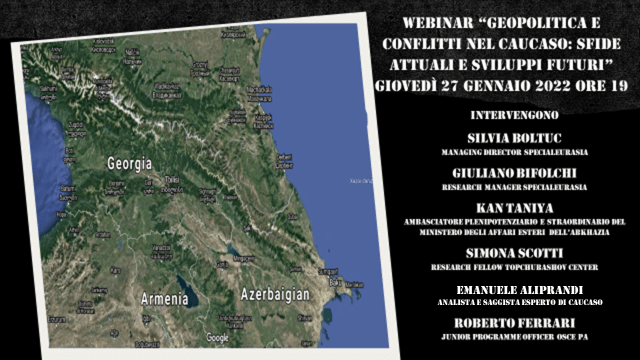
On January 27th, 2022, SpecialEurasia organised the Webinar “Geopolitica e conflitti nel Caucaso: sfide attuali e sviluppi futuri” to analyse with scholars and experts the current situation of the Caucasus and discuss future developments and challenges in the region.
SpecialEurasia organised the webinar in the Italian language in partnership with the media agency Notizie Geopolitiche, the think tank CeSEM – Centro Studi Eurasia Mediterraneo and the magazine Opinio Juris – Law & Political Review. Domenico Nocerino, editor-in-chief of Opinio Juris, chaired the panel attended by Silvia Boltuc, Managing Director of SpecialEurasia, Giuliano Bifolchi, Research Manager of SpecialEurasia, Emanuele Aliprandi, political analyst specialised in the Caucasus, Simona Scotti, Research Fellow at Topchubashov Center of Baku, Kan Taniyya, Plenipotentiary and Extraordinary Ambassador of the Ministry of Foreign Affairs of the Republic of Abkhazia, and Riccardo Ferrari, Junior Program Officer at the Parliamentary Assembly of the Organization for Security and Cooperation in Europe (PA OSCE).
In his presentation, Giuliano Bifolchi stressed that the Caucasus has a strategic role in the Eurasian geopolitical chessboard. Undeniably, the region is a ‘bridge’ between Europe and Asia and a ‘barrier/frontier’ between the Christian and the Muslim worlds. Looking at its geography, position, and natural resources, the Caucasus might become a logistic hub and interconnector between north-south and west-east linked with the Belt and Road Initiative, the International North-South Transport Corridor (INSTC). Investing in the Caucasus is an excellent opportunity for foreign entrepreneurs even though the region presents some obstacles such as the ‘frozen conflicts’ (Nagorno-Karabakh, Abkhazia, South Ossetia, East Prigorodny), border crisis (Ingushetia-Chechnya, Chechnya-Dagestan, Dagestan-Azerbaijan), high level of corruption, inter-ethnic conflict, and terrorist activities.
Emanuele Aliprandi focused his presentation on the Nagorno-Karabakh conflict and the current situation in Armenia and the Republic of Nagorno-Karabakh/Artsakh. In his opinion, the problem of recognising the Republic of Nagorno-Karabakh exists since, after the 2020 Nagorno-Karabakh conflict, Baku considered the regional situation resolved. Considering that the Russian peacekeeping forces will remain in the region for five years with the possibility to extend their presence for another five years, the conflict might explode again in case of the absence of an external force that guarantees stability.
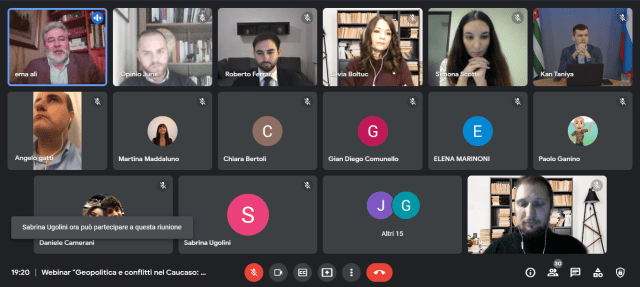
Simona Scotti presented her research on the Azerbaijani reconstruction project in Nagorno-Karabakh and the Italian economic interests in the region. Scotti stressed the problem of the landmines disseminated in the region and Baku’s commitment to overcoming this problem to allow the reconstruction process. Among the success of the reconstruction process, which began soon after the conflict, Simona Scotti mentioned the airport of Fuzuli. Among the projects that the Azerbaijani Government is implementing, special attention could be given to the Smart Villages, whose purpose is to build 200 ecological houses, four non-residential buildings, a school for around 360 students, and smart agricultural infrastructures. Furthermore, Baku aims at transforming Agdam into an industrial centre, Susha into a cultural centre considering the role that this city has played in the Azeri society and culture, Kelbajar into a logistic hub and Jabrayl into a commercial and logistic hub. Talking about the Italian interests in Azerbaijan, Simona Scotti highlighted that Italy is one of the leading countries involved in the Nagorno-Karabakh reconstruction process.
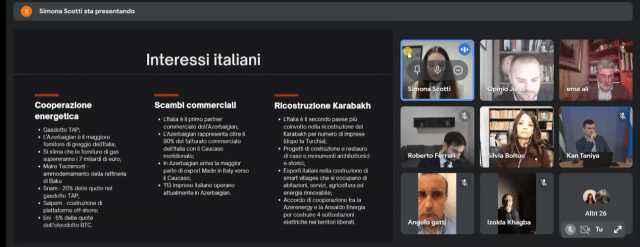
Kan Taniya briefly presented the history and geopolitics of the Republic of Abkhazia, stressing that Sukhum seeks international recognition. He emphasised the Russian Federation’s significant role in supporting the Republic of Abkhazia, its independence, and international recognition. After the 2008 Russian-Georgian Conflict that marked the independence of Abkhazia and South Ossetia, Kan Taniya underlined that the Georgian Government changed its strategy and shifted the target of the conflict from Abkhazia to Russia. Kan Taniya stressed that in Abkhazia, there is no sign of external occupation, as Tbilisi has always stated. By contrast, the country has regular elections as the future parliamentary elections planned for March 12th, 2022. According to Kan Taniya, the case of Abkhazia and its international recognition has highlighted the double standard policy: it seems that the countries that the United States supports have more rights and opportunities to be internationally recognised than those countries that are allied with the Russian Federation.
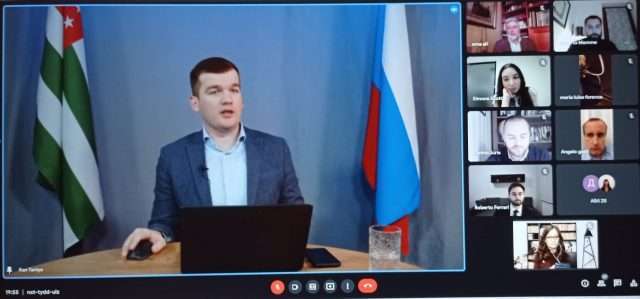
Silvia Boltuc analysed the Iranian interests in the Caucasus and Tehran’s geopolitical and economic role. According to Boltuc, Iran aims at substituting the Turkish energy route towards Europe exploiting the Caucasus, mainly Georgia and Armenia. In the Caucasus, Tehran is a Moscow and Yerevan’s ally, although, after the 2020 Nagorno-Karabakh conflict, the Iranian Government aims at also cooperating with Baku. Silvia Boltuc noted that, since Armenia is a member of the Eurasian Economic Union (EAEU) and Iran has a special agreement with this organisation, Yerevan opened a Free Economic Zone at the Armenian-Iranian borders aiming at playing a transit role for the Iranian goods into the EAEU. In the North Caucasus, Iran is among the leading commercial and investing partners exploiting its good relations with Moscow and a cultural and historical common background, and its ports on the Caspian Sea linked with the Dagestani port Makhachkala or the port of Astrakhan.
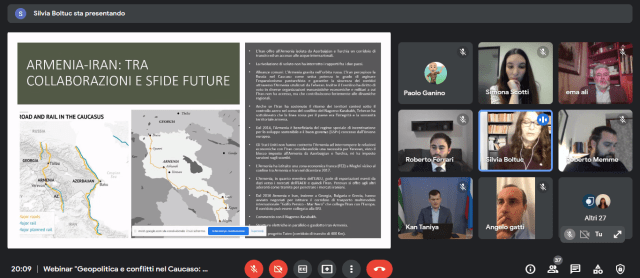
Roberto Ferrari presented OSCE’s activities in the Caucasus and discussed the democratic process and the transparency of the electoral system in the Caucasus. Ferrari stressed that The OSCE Parliamentary Assembly offers a network and dialogue platform necessary to overcome regional disputes and conflicts, including all the parties involved. He also noted that the Azerbaijani Government wants to stabilise the region and create the transport corridors with Armenia considering the possibility to create a link with the Belt and Road Initiative. On the one hand, it seems that Baku archived the 2020 Nagorno-Karabakh conflict to overcome regional instability. On the other hand, as the Armenian Prime Minister Nikol Pashinyan recently stated, Yerevan needs several territorial and borders issues to be resolved before planning any interconnection projects. Indeed, although establishing Armenian-Azerbaijani corridors might benefit the entire region and boost the local socio-economic development, without a common agreement on territorial disputes, the regional stability will always be precarious and under the threat of a future military escalation.
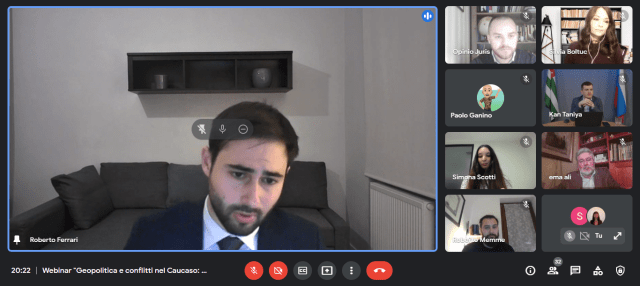
For further information or analyses about the Caucasus region, it is possible to contact the SpecialEurasia team at info@specialeurasia.com or visit our dedicated section Kavkaz.
